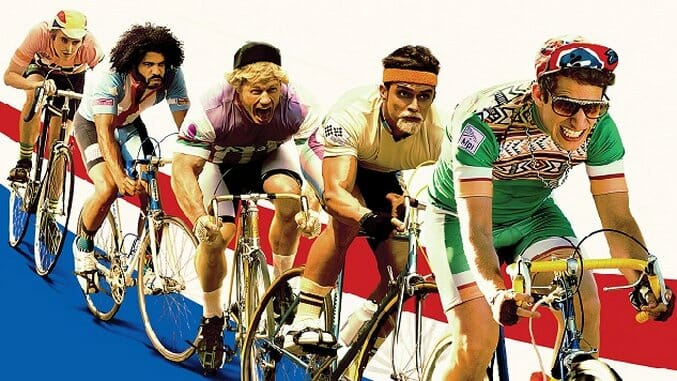Tour de Pharmacy Is Another Triumph of Absurdity for HBO
Image made available by HBO
I like sports, and I like comedy. Drilling deeper on those two subjects, I’m one of those weird Americans who actually loves the Tour de France (seriously—I’ve written about it. Twice.), and I’m one of those comedy weirdos who loved Seven Days in Hell, the 2015 HBO sports mockumentary from the team of Andy Samberg, writer Murray Miller, and director Jake Szymanski (I wrote about that too). So, ask yourself—when HBO accidentally combined two of my favorite things in Tour de Pharmacy, the mockumentary that aired this past weekend about the fictional 1982 Tour de France, what were the chances that I’d have anything but lavish praise for the entire production?
I don’t.
That is, I don’t have anything but lavish praise for the entire production. If you’d prefer to read a more sober piece of criticism, I’m sure there’s somebody out there who can tell you which parts failed some objective test of comedy, or something. Go read that, if you want. You piece of shit.
Sorry, too harsh. Look, one of my regrets as a comedy fan is that even within the wider landscape of television and film that we’re blessed with in 2017, we don’t get a ton of comedy that is both plot-based and absurd. As in, it tells a coherent story with a beginning, middle and end, but it also subverts reality and goes on strange tangents and delivers really cheap laughs with incredibly elaborate set-ups and also shocks you with an abundance of penises. As far as I can tell, there is nothing else out there quite like it. You might be tempted to compare it to a Christopher Guest film, but it’s not the same—his movies derive comedy from the foibles of characters who take themselves too seriously and get into bizarre situations, but they don’t devolve into absurdity. The best comedic comparison I can think of is Jack Handey’s Deep Thoughts, which are not films or TV programs at all, but very short jokes that rarely last longer than a paragraph.
Imagine this as a 30-minute mockumentary, and you’re getting close:
“I’ll take that little one, way in the back,” I said.
“That little collie mix?” said the animal shelter guy.
“No,” I said, “the one behind him.”
“The gray terrier?” he said.
“He’s gray,” I said,”but way in the back, in the corner.”
“You mean the water faucet?” he said. I realized then it was a water faucet, but I didn’t want to look like a jerk, so I said,”Yeah, that’s the one I want.”
It ended up costing me almost five hundred dollars to get that faucet removed. But you know, I’ve still got that faucet, and I wouldn’t trade it for any dog in the world.
Even still, these are poor descriptions of exactly what they’re offering, because the narrative element is oddly compelling on its own, even without the comedy. In that sense, the other parallel worth drawing is to Armando Iannucci, both for his intricate storylines and because for pure volume of jokes—laughs per second—only a show like Veep or The Thick of It merits comparison to these mockumentaries.
It may sound paradoxical, but in a work of absurdity, plot often plays a very functional role. In Seven Days in Hell, the Legends of Sports team told the story of a Wimbledon match between two flawed champions that went on interminably until both died simultaneously on the court. It was inspired in part, I’m willing to bet, by the real-life 2010 match between John Isner and Nicolas Mahut, which spanned three days and took over 11 hours of match time to complete. Likewise, as the title Tour de Pharmacy suggests, their newest project centers on the pervasive, and possibly permanent, “crisis” of performance-enhancing drugs in professional cycling. In their version of the ‘82 race, all but five competitors are kicked out for paying a $50,000 bribe to the race sponsor in exchange for immunity from drug tests, and the satisfying drama follows the five remaining cyclists as they cross France over three grueling weeks. If you let your vision blur just a little, and forgive the exaggerations, this premise could work as a straight sports movie. And this is critical, because it’s the foundation on which the comedy is built—the thing that keeps us squinting at the narrative horizon, anticipating the next plot turn, while they’re busy pulling the rug out from under our feet.
But of course, the comedy is even more critical. When I wrote about Seven Days in Hell, I singled out a really brilliant tangent about a revolutionary courtroom sketch artist—a diversion that had only the loosest connection to the story, was featured far longer than any actual documentarian would deem appropriate, and was treated with absolute paramount importance by everyone in the story. This is their particular brand of absurdity, and it’s glorious in the way it takes crazy risks that rewards comedy psychopaths like me, and would perhaps leave an average viewer behind). You can imagine my perverse delight when I found that Tour de Pharmacy has several brilliant deviations in just this vein.
My favorite—the one that left me laughing so hard that I missed the next three minutes or so—came while they explained exactly how the rest of the field got kicked out of the race. See if you can follow me here, plot only:
-

-

-

-

-

-

-

-

-

-

-

-

-

-

-

-

-

-

-

-

-

-

-

-

-

-

-

-

-

-

-

-

-

-

-

-

-

-

-

-








































